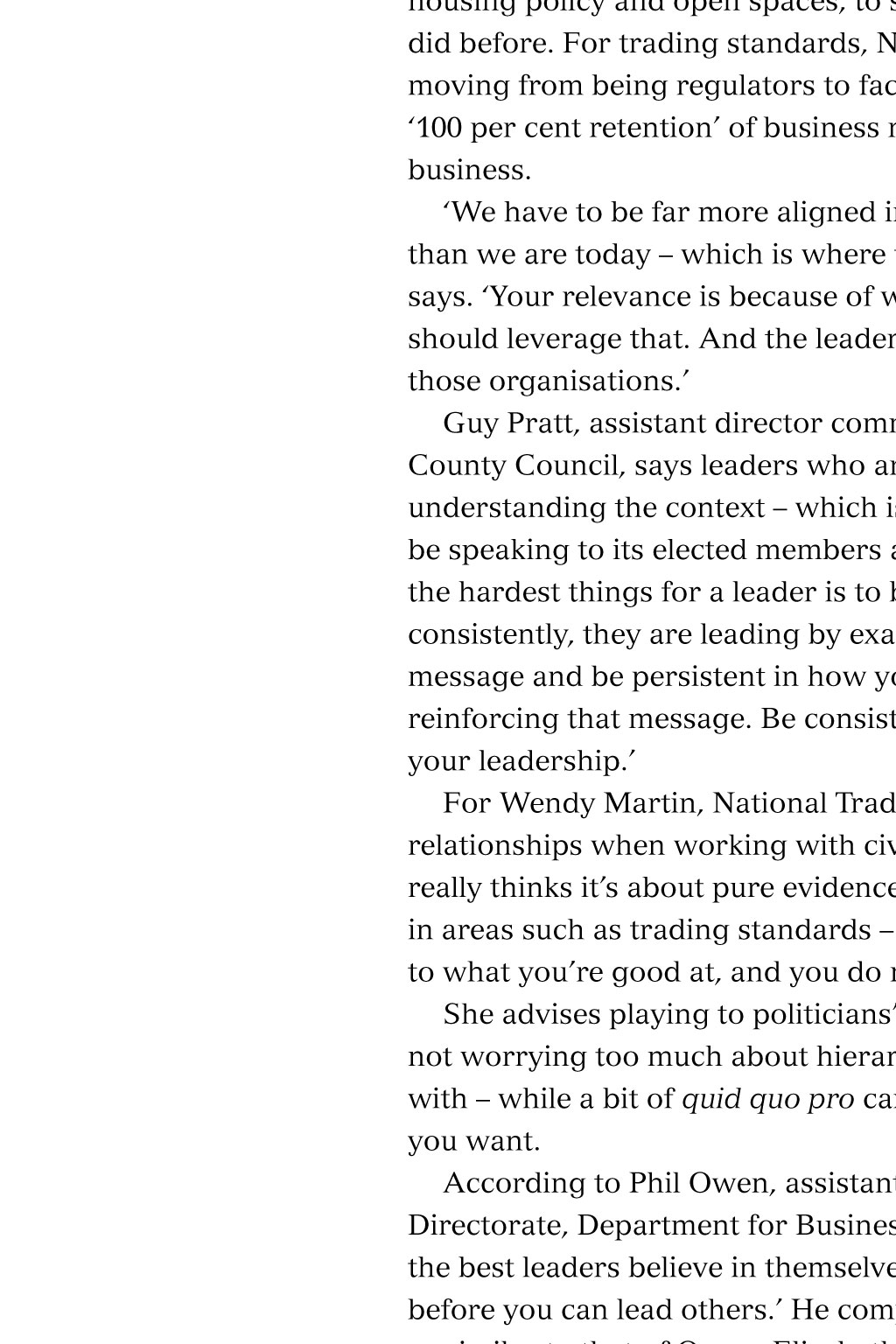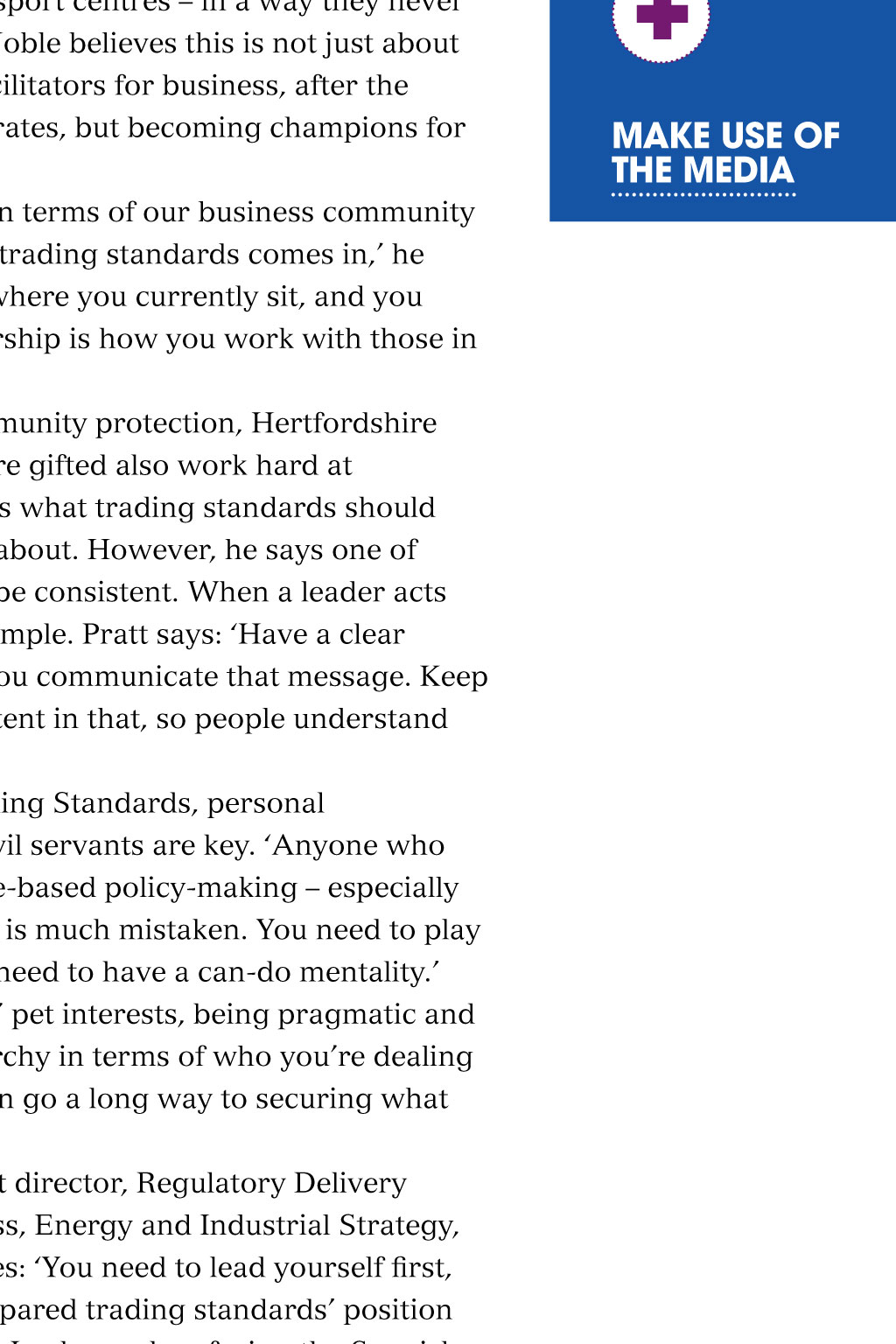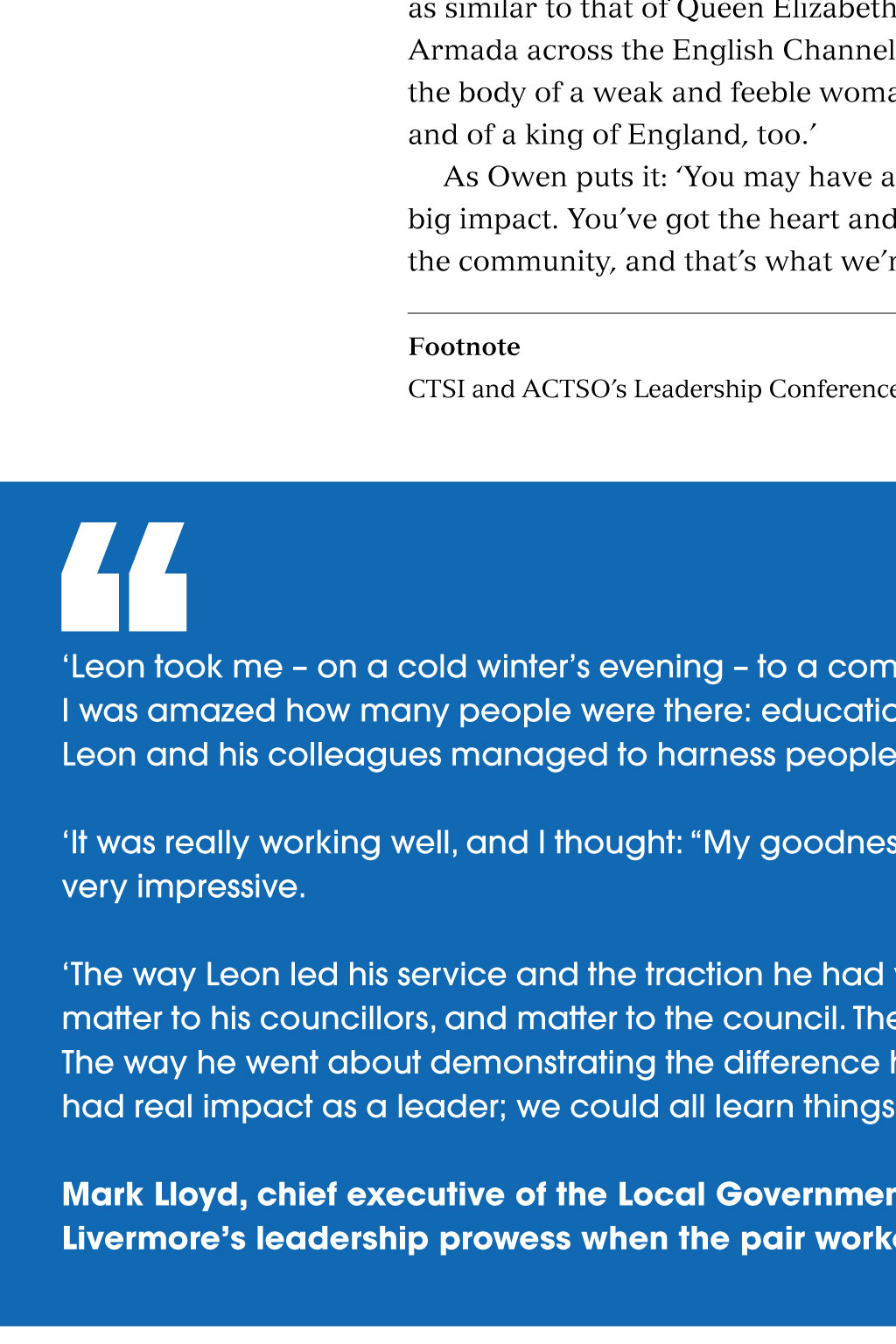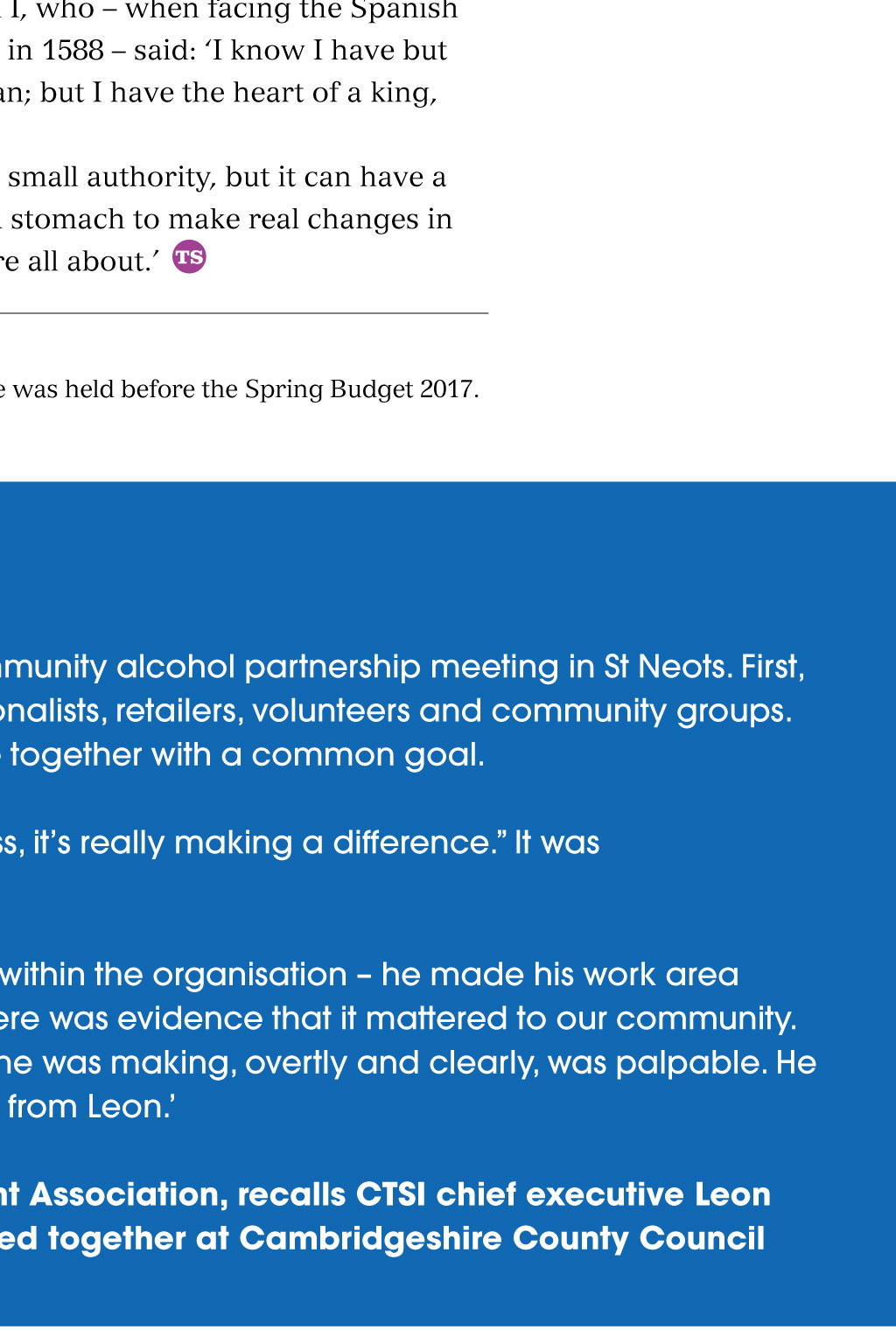
































Hertfordshire County Council John barradell Town clerk and chief executive, City of London Corporation phil owen Assistant director, Regulatory Delivery Directorate, Department for Power of persuasion Business, Energy and Industrial Strategy Colin Noble Leader and Conservative group leader, Suffolk County Council Wendy martin National Trading Standards Trading standards is at a crossroads, and future success depends on its leaders ability to chart a new course for the profession, reports carina Bailey M any a snappy phrase has been invented to explain the essence of leadership. There are the three Gs and the three Ps, but John Barradell favours the four Rs: relevance, responsibility, reliability and being radical. The town clerk and chief executive of the City of London Corporation was one of many leaders and heads of service at CTSIs first LeadershipConference, held at the Barbican, in London, earlier this year. One of the main debates was how against a backdrop of deeper cuts a small service such as trading standards can engage effectively with politicians and senior officers, while ensuring services have an impact in their communities. Inevitably, success will be dependent on the quality of trading standards leaders. According to Barradell, it is the responsibility of leaders in any field to articulate a vision to articulate the reason you exist and articulate why people should care about you. He believes the principles set out in the four Rs offer a great guide to achieving this. Understand the relevance of you and your organisation, Barradell advises. Are you relevant to today; to your constituents; to the people that you serve? Test yourself against those questions. Responsibility, he adds, is about the right use of assets, and about understanding the powers you have and using those in an effective and proper way. Be radical, says Barradell simply. Institutions, organisations and professions only survive if they are relevant, responsible, reliable and radical. Radical means adaptable. Adaptability is about understanding S ET TINg THE SCENE By the end of the decade, the Local Government Association (LGA) has calculated that councils will be facing a funding deficit of 5.8bn, with adult social services accounting for 1.3bn of that. Keynote speaker Mark Lloyd, the LGAs chief executive, said: Adult social care is not in a safe place now. We have organisations that are handing back contracts to councils because they cant make the contract pay. We need an injection of 1.3bn immediately, and 1.3bn over the next handful of years. According to Lloyd, the biggest pressure is being felt by childrens services, which is facing a 1.9bn deficit. Then all the rest of the councils activities still have a deficit of 2.3bn which includes trading standards. There is no happy picture around the cash. Q&a the context in which you work, understanding your value and adapting to meet the need. He points out that e-crime is a good example of a topic that trading standards needs to understand, adapt to and upskill for, to tackle the threats it poses to consumers and legitimate business. Barradell admits that he has been lobbied on his final point reliability many times by those who believe it is linked to capacity in the system. You have to have the tools and the individuals to be able to undertake the work, he explains. There will be a role for you in articulating why reliability and the quality side become even more important in a changing world. In this new Brexit world, the argument for trading standards relevance has never been more compelling, according to Barradell. He believes the profession has a unique opportunity to influence policy and decision-makers, nationally and locally, to make sure consumer and business confidence and protection doesnt get diminished. It does mean that there is even more work for the Chartered Trading Standards Institute and colleagues to do, he adds. It puts more work on you as a profession. But, Barradell cautions, this move to policy influencer will require some upskilling. Towering above all four of these leadership qualities and breaking with his alliteration is influence. Barradell explains: Most leaders outlast their chief executives. This is about relationships, so when I talk about influence, build the relationship with your cabinet member or whatever system youre using so that they trust what you tell them. Because trust is the basis of good decision-making. Recommendations to members are based upon evidence and, if the member trusts your judgement, they will go along with it. Which is why influence is probably the strongest word Id say for leadership. As well as influence and the four Rs, personal leadership has specific qualities, too. According to Barradell, leaders have to be gifted, game and generous. Gifted doesnt just mean an ability to learn it also means you work hard. Gifted leaders are the ones who read the papers before they go to a meeting; who do the work in advance to understand the context. Gifted people by themselves are of no use to us or organisations only gifted people who work are of any use. A game leader understands risk, and is prepared to take calculated, measured ones although leaders need to give themselves and others the space to do this, otherwise they fail to be adaptable. Generous leaders are rare. They understand when the person following them needs to be developed and nurtured, and can spot when services in their organisation could benefit from collaboration, or from their skills and expertise. Generosity in a leader is, unfortunately, the thing you very seldom see, Barradell says. But its a key aspect of what we now need to do, both professionally and as a public service, to work together to face what will be a fascinating and in my view a very interesting, challenging and rewarding time to continue what we do in a changing environment. What could be a better time than now to be a public servant? For Colin Noble, the son of a builder, constructing resilience in communities is what trading standards relevance is all about. Community has played a defining role throughout his life, from his boyhood days travelling to school in the back of a builders van, to his time today as the leader of and Conservative group leader at Suffolk County Council. He explains: One of the things that has always struck me is, how are we going to deal with the financial challenges within local government? How are we going to change? In Suffolk, we started something called Supporting Lives, Connecting Community, and its really about how you build community resilience; how you build capacity in communities to do things for themselves. When I was a youngster, the family did things; the company did things, the workmen did things. If there was a problem in the village, it got sorted out within our own community. However, Noble cautions strongly against the distractions that come during challenging periods, describing talk of a trading standards restructure as a monumental mistake. Your relevance is because you operate within councils, and your relevance is because they operate in communities, he adds. And how you build strong communities is, you play an important part. He draws parallels with the initial apprehension around public health being placed in local government, and the leaders who have since emerged; their sense of opportunity, and the recognition that they do have the ability to influence all aspects of public service from housing policy and open spaces, to sport centres in a way they never did before. For trading standards, Noble believes this is not just about moving from being regulators to facilitators for business, after the 100 per cent retention of business rates, but becoming champions for business. We have to be far more aligned in terms of our business community than we are today which is where trading standards comes in, he says. Your relevance is because of where you currently sit, and you should leverage that. And the leadership is how you work with those in those organisations. Guy Pratt, assistant director community protection, Hertfordshire County Council, says leaders who are gifted also work hard at understanding the context which is what trading standards should be speaking to its elected members about. However, he says one of the hardest things for a leader is to be consistent. When a leader acts consistently, they are leading by example. Pratt says: Have a clear message and be persistent in how you communicate that message. Keep reinforcing that message. Be consistent in that, so people understand your leadership. For Wendy Martin, National Trading Standards, personal relationships when working with civil servants are key. Anyone who really thinks its about pure evidence-based policy-making especially in areas such as trading standards is much mistaken. You need to play to what youre good at, and you do need to have a can-do mentality. She advises playing to politicians pet interests, being pragmatic and not worrying too much about hierarchy in terms of who youre dealing with while a bit of quid quo pro can go a long way to securing what you want. According to Phil Owen, assistant director, Regulatory Delivery Directorate, Department for Business, Energy and Industrial Strategy, the best leaders believe in themselves: You need to lead yourself first, before you can lead others. He compared trading standards position as similar to that of Queen Elizabeth I, who when facing the Spanish Armada across the English Channel in 1588 said: I know I have but the body of a weak and feeble woman; but I have the heart of a king, and of a king of England, too. As Owen puts it: You may have a small authority, but it can have a big impact. Youve got the heart and stomach to make real changes in the community, and thats what were all about. makE uSE oF THE mEDIa Footnote CTSIs Leadership Conference was held before the Spring Budget 2017. Leon took me on a cold winters evening to a community alcohol partnership meeting in St Neots. First, I was amazed how many people were there: educationalists, retailers, volunteers and community groups. Leon and his colleagues managed to harness people together with a common goal. It was really working well, and I thought: My goodness, its really making a difference. It was very impressive. The way Leon led his service and the traction he had within the organisation he made his work area matter to his councillors, and matter to the council. There was evidence that it mattered to our community. The way he went about demonstrating the difference he was making, overtly and clearly, was palpable. He had real impact as a leader; we could all learn things from Leon. mark Lloyd, chief executive of the Local government association, recalls CTSI chief executive Leon Livermores leadership prowess when the pair worked together at Cambridgeshire County Council Credits Carina Bailey is editor of TS Today. You might also like To share this page, in the toolbar click on Leading by example, page 36, May 2015 Images: Piers Allardyce edition of TS Review. Show and tell, page 31, February 2016 edition of TS Review. Q&a Q Sara barry: Charging for work that we used to do for free, how does that chime with supporting business prosperity when business-rates retention could be seen as double pay? a mark Lloyd: Councils create three forms of income 1. Grant from government 2. Taxes levied on local people 3. Charging fees for services we render They all need to be kept under constant review. Do the LOral test: Is it worth it? Its entirely right for it to be in the scope for consideration, but its down to local leaders to make the right, educated, informed choice. Consider it, but see it in a policy context. makE uSE oF THE mEDIa Mark Lloyd, chief executive of the Local Government Association (LGA), advises trading standards to make more use of the national media by working with the LGA. He says: Every weekend the LGA runs a consumer story. Were just trying to demonstrate to local government that were on their side, tackling the same issues that matter to their community. Theres a big opportunity for you to programme the national news by making sure your issues are on our agenda. He says stories should be about the issues that chime with the community, and recommends officers try to persuade councillors to promote trading standards issues on Twitter, rather than doing it themselves. I used Twitter as a voyeur when I was chief executive [of Cambridge County Council]. I was not elected; I wasnt the voice or face of the council. Do ponder who, or what, is your voice? If you find yourself getting more airtime than politicians, just be a bit canny about that. The clever trick is, how do you get councillors to do it? Start making a big deal about the sorts of things you do that matter. Lloyd asks: how do councillors know what youre doing, about the impact youre having? How can you help make a tangible, palpable difference? His answer is: Make the weather suit the context. Take on the challenges. Dont be passive in this process.